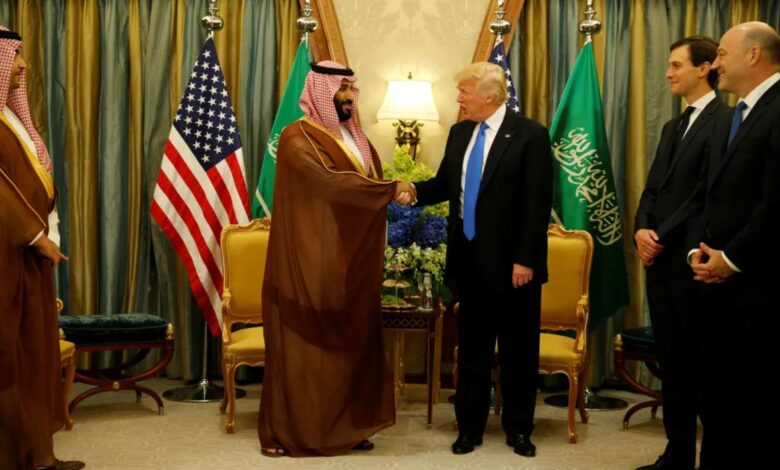Mideast trip is Trump’s chance to derail Iran’s nuke schemes

Eight years later, everything’s different — except the path forward.
That’s the reality as President Donald Trump prepares to visit the Middle East starting Tuesday.
In 2017, when Trump chose Saudi Arabia for his first overseas trip as president, the United States had time to stop Iran from getting a nuclear weapon.
Now, the clock has nearly run out, and Iran could be weeks away from its goal.
To end Iran’s nuclear threat and prevent a wider war, Trump should look to his own record of peace through strength — and ignore the isolationists in his administration, just as he did before.
Trump is right to prioritize meeting with our allies in the Middle East.
Eight years ago, his visit began a historic shift in the region, paving the way for the Abraham Accords that promoted unprecedented cooperation between Israel and a growing number of Arab countries.
Trump went on to pull out of President Barack Obama’s failed nuclear deal, hit Iran with devastating sanctions that crippled its economy and ordered the attack that killed Iranian terror mastermind Qasem Soleimani.
In Trump’s first term, Iran came no closer to a nuclear weapon, precisely because it was sapped of financial resources and feared US strength.
But over the last four years, Joe Biden systemically weakened the pressure as he desperately tried to re-enter the Obama-era deal.
Recognizing that Biden would do nothing meaningful to stop it, the Iranian regime shifted its nuclear program into overdrive. By the end of his tenure, Iran was as little as one week away from a nuclear bomb.
Once again, Trump has an opportunity to solve the Iran nuclear crisis.
He should recognize that while Iran’s nuclear program is stronger than ever, its bargaining position is much weaker: While Biden dithered, Israel put Iran on the back foot by decimating its terrorist proxy Hezbollah, and even destroying Iran’s primary air defenses.
Thanks to Israel, the Iranian regime is now more vulnerable to a targeted military attack on its nuclear infrastructure, as well as the re-imposition of crippling economic sanctions.
Trump has already built on his first-term wins by reviving his “maximum pressure” campaign against Iran, and he recently said he wants a “total dismantlement” of Iran’s nuclear program.
Make no mistake: This is the message the murderous dictators who say “Death to Israel” and “Death to America” need to hear.
But isolationists within his own administration oppose Trump’s strong stand, pushing him in effect to follow Biden and pursue an Obama-like deal.
This is beyond foolish.
As Trump’s ambassador to the United Nations, I saw how Iran will break weak agreements, which it did by launching ballistic missiles, smuggling arms and advancing missile technology in direct violation of UN Resolution 2331.
I also saw that Iran will only agree to outside monitoring of its nuclear program if it’s given time to hide any evidence of deceit, as was clear when I visited the International Atomic Energy Agency on Trump’s behalf in 2017.
The only way to overcome Iran’s cheating nature is to lay out painful consequences. The ayatollahs need to fear that the US and our allies will strike their nuclear program at a moment’s notice.
While Republican isolationists worry that the threat of a strike could lead to war, the truth is threatening an attack makes war less likely.
A nuclear-armed Iran would spark an arms race in the Middle East — and the regime is all but guaranteed to use its new power to attempt to destroy Israel.
A wider conflict would threaten to drag in the United States, Israel’s strongest ally, endangering tens of thousands of our service members stationed in the region and beyond.
But if Iran fears it will be attacked before it can create a weapon, it has an incentive to give up its nuclear program for good, like Libya did in 2003 — saving American lives.
That is President Trump’s stated goal. Now he needs the plan to match, and he should announce it during his Middle East trip.
First, he should unveil unprecedented sanctions, following through on his threats to sanction China for buying Iranian oil, which is keeping Iran’s economy afloat.
Second, he should rally our regional allies and partners to present a united front against Iranian aggression.
Third and most important, he should make clear that the US will support a military strike against Iran’s nuclear program if Iran isn’t willing to end it.
The president knows that peace through strength works. He proved it for four straight years, starting with his initial trip to the Middle East in 2017.
Given the utter failure of the Biden administration, the stakes are now much higher — but the path to success hasn’t changed.
Trump’s trip this week should mark the beginning of the end of Iran’s nuclear program.
He may not get another chance.
Nikki Haley, the Walter P. Stern Chair at the Hudson Institute, was US ambassador to the United Nations and governor of South Carolina.




